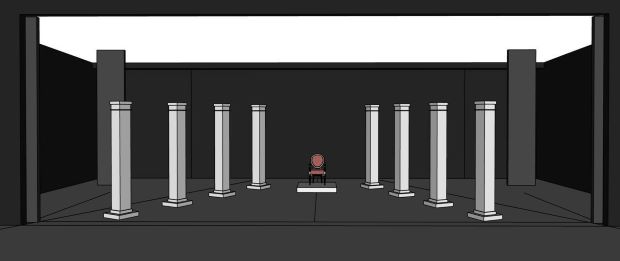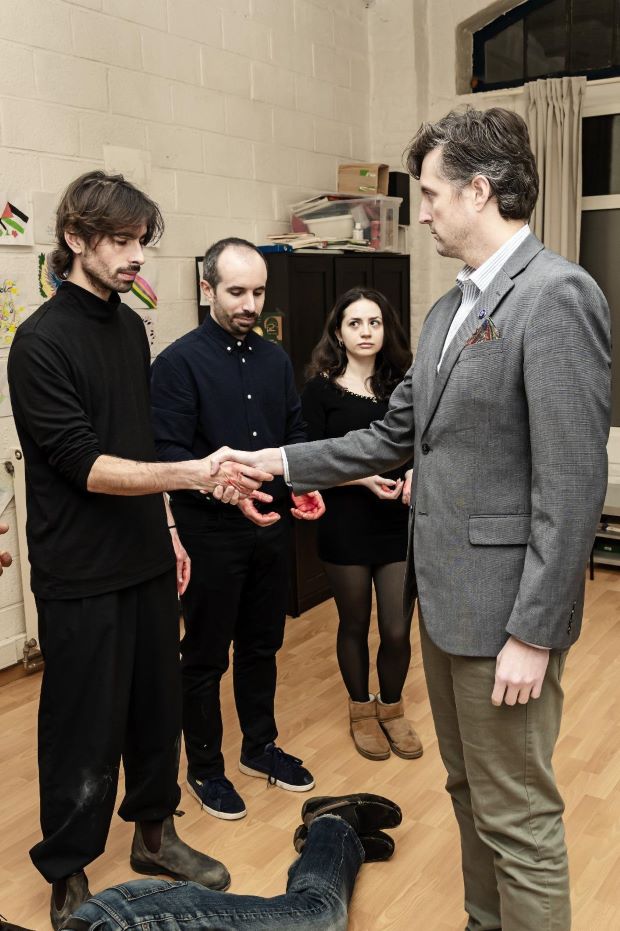- Daily & Weekly newsletters
- Buy & download The Bulletin
- Comment on our articles
Shakespeare meets modern politics: Julius Caesar comes to Brussels
New year, new play! The Brussels Shakespeare Society (BSS) is proud to stage Julius Caesar at the Centre Culturel Jacques Franck from 21 to 25 January.
Reimagined as a cautionary tale set in 21st-century Italy — the production explores a world of political polarisation, populism and collapsing institutions. It promises a gripping blend of timeless Shakespearean drama and razor-sharp political commentary, weaving together themes of power, ambition, betrayal and the consequences of division.
This isn’t just a play for history buffs or Shakespeare purists—it’s relevance for the modern age aims to resonate with Brussels’ politically engaged international audiences.

In the adaptation, an abstract set (pictured) with columns displayed in multiple configurations shows a Rome in the early 2000s: an era that saw political upheaval, media monopolies and the rise of larger-than-life populist leaders. The parallels to today’s Europe are intentional, as the production explores the consequences of populist rhetoric, neoliberal technocracies and of the unrestrained ambition of leaders.
Julius Caesar is portrayed as a populist reformer beloved by the masses – because it’s not like Italy hasn’t had controversial prime ministers in its political past!
Caesar’s victories on the battlefield and promises to uplift veterans and the lower classes have made him wildly popular. Yet, beneath the surface, his leadership reeks of authoritarianism disguised as a republic—a system where media concentration stifles dissent and ethical scandals are weaved, including some which involve much younger women.
Opposing Caesar are Brutus and Cassius, leaders of the “Republican” faction, who advocate for traditional governance and closer ties to the European Union. Their fatal mistake? Underestimating the power of the people and failing to foresee the chaos that would follow Caesar’s assassination. For Brussels audiences immersed in debates about the EU’s balance of power and democratic accountability, these themes will feel strikingly familiar.
This production sheds new light on Shakespeare’s characters, portraying them as deeply human figures grappling with political and personal crises.

- Brutus, portrayed as an idealistic but overworked leader, mirrors the technocrats who step in during government collapses. Though driven by love for Rome and a desire to preserve democracy, his naivety and inability to connect with the people ultimately doom his cause.
- Cassius is a calculating and vindictive figure whose jealousy and political frustrations turn into paranoia and depression. His arc, culminating in suicide, reflects the toll of high-stakes political maneuvering.
- Mark Antony embodies populism’s fiery rhetoric, rallying the masses through raw emotions.
- Octavius, traditionally Caesar’s nephew and heir, is cast as a woman, drawing parallels to modern-day nationalist leaders such as Giorgia Meloni. Her calculated rise to power is accompanied by multimedia elements that track her transformation into Augustus, the first Emperor of Rome—a stark commentary on Europe’s rightward political shift.
The play’s direction aims to bring a visual language to the stage, combining Shakespeare’s text with dynamic movement pieces that depict the abstract mechanics of power. From the rigid order of Caesar’s tyranny to the chaos of civil war, the choreography becomes a metaphor for the political and emotional turmoil engulfing the characters.
Moreover audience interaction is another key feature. For the first time in a BSS show the audience will be invited to engage directly with the characters, blurring the line between spectator and participant.
Whether you’re a Shakespeare enthusiast, a political junkie, or simply a lover of innovative theatre, this production promises to be one of the most talked-about events of the year. With its modern setting, experimental staging, and searing political insights, Julius Caesar is a must-see for anyone grappling with the challenges of power, ambition and the future of democracy.
Julius Caesar
21 to 25 January
Centre Culturel Jacques Franck
Chaussée de Waterloo 94
Saint-Gilles



















